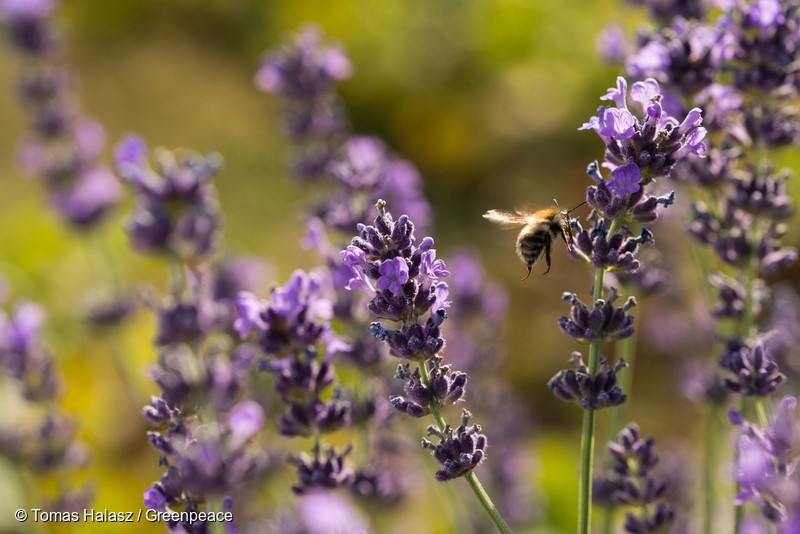Proposed EU restrictions on neonicotinoids would allow use in greenhouses
Brussels/Exeter – Bees and other wildlife are exposed to neonicotinoid pesticides even if they are used only inside greenhouses, a new study published today by Greenpeace Science Unit reveals.
The new research from Greenpeace Science Unit is available here.
Representatives of European governments will meet on Tuesday and Wednesday to discuss and possibly vote on a European Commission plan to tighten restrictions on three neonicotinoids. Crucially, the plan would allow the continued use of these pesticides in greenhouses.
The Greenpeace study found that neonicotinoids are frequently present in waterways close to greenhouses where they have been used. Reviews of previous research have shown that neonicotinoids not only kill bees outright, but also have sublethal effects like impairing the bees’ ability to navigate and reproduce, which contribute to the decline in bee populations. They also pose also a threat to many other species, such as water insects. Greenpeace is calling for a full ban of all neonicotinoids.
Dr Kirsten Thompson, scientist at Greenpeace Science Unit at Exeter University, said: “Even if neonicotinoids are used exclusively inside greenhouses, they contaminate the surrounding environment. Their use may be restricted in principle, but the danger they pose to bees and other wildlife is not. Only a full ban would protect bees, other pollinators and wildlife from neonicotinoids.”
In 2013, the European Commission introduced restrictions on three neonicotinoids – Bayer’s imidacloprid and clothianidin, and Syngenta’s thiamethoxam – banning some uses on crops attractive to bees, such as sunflowers, oilseed rape, apples, almonds and cucumbers. Many other uses of these pesticides are still allowed, including spraying crops after flowering and use on crops considered less attractive to bees, for example cereals sown in winter or sugar beet.
EU vote on new restrictions
In March 2017, the Commission drew up a plan to ban imidacloprid, clothianidin and thiamethoxam, but still allow their use in greenhouses. This plan is based on an assessment by the European Food Safety Authority (EFSA) that warns these chemicals can harm bees not only through dust drift from coated seeds and crop spraying, but also via residues in the wider environment.
France will ban neonicotinoids from 1 September 2018, with certain uses allowed until 1 July 2020.
Apart from imidacloprid, clothianidin, and thiamethoxam, four other neonicotinoids are approved for unrestricted use in the EU – acetamiprid, thiacloprid, sulfoxaflor and flupyradifurone – and are increasingly used as substitutes for the three restricted pesticides.
Contacts:
Franziska Achterberg, Greenpeace EU food policy director: +32 (0)498 36 24 03, [email protected]
Greenpeace EU press desk: +32 (0)2 274 1911, [email protected]
For breaking news and comment on EU affairs: www.twitter.com/GreenpeaceEU
Greenpeace is an independent global campaigning organisation that acts to change attitudes and behaviour, to protect and conserve the environment and to promote peace. Greenpeace does not accept donations from governments, the EU, businesses or political parties.

